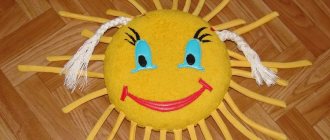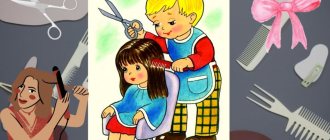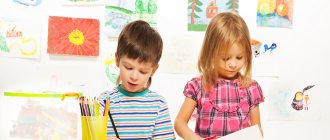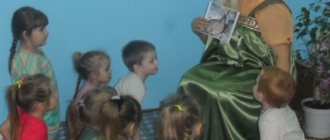Lesson notes on the social world in the middle group. Topic: “Health School”.
Lesson notes on the social world in the middle group.
Subject: "
School of Health".
Target:
- Strengthen knowledge about the senses; clarify the importance of hearing, vision, taste, smell and touch for a person in understanding the world. Learn to convey various emotional states.
- Promote the development of attention, logical thinking, memory and imagination.
- Foster the need to be healthy and take care of your body.
Material and equipment:-
pictures depicting sensory organs; blindfold scarf; “wonderful bag” with a set of small items; cups with scented items, napkin.
Progress of the lesson
IN:
Children, today we are going to the School of Health. We will visit different laboratories where research is carried out on human sensory organs. What sense organs do you know? (Children's answers.) That's right, these are eyes, ears, nose, tongue, hands. They help us understand the world around us, and that is why we call them our assistants. Let's go to the first laboratory. I will tell you a riddle, and after you guess it, you will understand what sense organ is being explored here.
Two windows at night
They close themselves
And with the sunrise
They open on their own. ( Eyes.
)
Yes, they study vision in this laboratory. Why do people need eyes? (Children's answers.) That's right, we see the world with our eyes. In order for your eyes to see well, you need to do special gymnastics.
Visual gymnastics complex
.
1. Close your eyes for 3-5 seconds, then open them wide. Repeat 6-8 times.
2. Blink quickly for 10-15 seconds. Repeat the exercise 3 times with an interval of 7-10 seconds.
3. Rub your palms together and easily, without effort, place them on your previously closed eyes for 30-40 seconds. Then lower your hands and open your eyes.
IN:
We enter the second laboratory. Guess the riddle:
Two brothers live on one head,
They hear everything, but don’t see each other. ( Ears
.)
Yes, this laboratory studies the organs of hearing. (Speaks quietly.) Squat down, stand up. (Children do.) Why did you sit down and stand up?
Children:
Because they heard what you said.
IN:
How did you hear it?
(Children's answers). What rules must be followed to ensure that your ears hear well and do not hurt? (Children’s answers.) (“Basic rules”, G. Zaitsev “Lessons from Moidodyr”, p. 11). And now, so that our ears can hear well, let's play the game “Recognize by voice” .
(Everyone stands in a circle, leading the child in the center. Children, holding hands, walk in a circle and say:
Alyosha (Sasha, Masha, etc.),
You're standing in a circle
We call you: “Ay!”
Close your eyes
Find out who called you!
The driver closes his eyes. One of the players calls his name. The driver must determine by voice who called him.
IN:
Let's move on to the next laboratory. To find out what they do here, guess the riddle:
Between two luminaries in the middle I am alone. ( Nose
.)
Children guess the riddle and answer the teacher’s question about why a person needs a nose.
Breathing exercise
. Inhale deeply through your nose and exhale slowly. Repeat 3-4 times.
Let's play the game "Recognize by Smell."
With their eyes closed, children are asked to identify by smell what is in the cups. (Chocolate, orange, onion, lemon.)
IN:
How else can you determine what kind of product it is without seeing it? (To taste.)
In the next laboratory they study this particular sense organ - the tongue. The surface of the tongue has areas, each of which perceives a specific taste. Tell me, what is sweet (bitter, sour, salty)? (Children's answers.) Let's play with the language.
Articulation gymnastics.
- "Cold - hot." Open your mouth slightly, place your wide tongue on your lower lip (count to 5 in your head), hide your tongue, close your mouth (count to 5). Repeat 3-4 times.
- "Swing". Open your mouth slightly, press the tip of your tongue to the roof of your mouth and slowly move your tongue up and down. Repeat 8-10 times.
- "Watch". Open your mouth slightly, touch the corner of your mouth with the tip of your tongue and slowly move your tongue left and right. Repeat 8-10 times.
- "Horse". Click your tongue.
IN:
Let's hold hands and remember the poem “How joyfully we live...”. Children (in chorus).
How joyfully we live.
We sing songs together,
We can laugh merrily
Make a joke, have fun
And sometimes argue
Well, never fight!
IN:
Well, here we are in the last laboratory.
Here they study the sense organs that are responsible for touch (sensation). Game “My ears are good, but my neighbor’s are better..”.
IN:
Let's see if we can find out what object is in the bag with our eyes closed.
Game “Wonderful Bag”
(the child is blindfolded, he must guess the object by touch). The game is repeated 4-5 times, played while standing.
IN:
So our tour of the School of Health has ended.
We talked about the importance of our senses and how they help us. And now we will smile.
Let's hold hands tightly. we will give each other farewell
(Children say good wishes to each other.)
Self-analysis of the teacher
This event was held on April 16, 2014 in the middle group. Children of middle preschool age. Most children have been attending the group since September 2013.
GCD had the character of a game, and was not the only one in the cycle of etiquette events. Before this, several events were held with the children, united by the theme “Etiquette”: “What is etiquette?”, “If you are polite”, “Table etiquette”, “Away etiquette”, “School of etiquette. We came to the theater,” which were aimed at studying and mastering the rules of behavior in society.
"ETIQUETTE LESSONS"
- the final one in a series of events this academic year.
Program content:
- learn to find the right solutions in various problem situations;
- improve the culture of dialogical speech: listen to the interlocutor, answer questions in complete sentences and phrases;
- practice using polite words;
- cultivate a culture of communication and a culture of behavior;
- develop mental activity in children.
Preliminary work:
memorizing poems about etiquette and polite words.
The lesson is structured in three stages: motivational, meaningful, reflective.
Motivation came from the problem posed: how to help friends get by without quarreling.
Reflective stage: summing up, drawing hearts with sparkles of kindness.
The following technologies were used in GCD: health-saving, gaming, ICT, collaboration technology, and a person-oriented approach.
All requirements for GCD etiquette were met:
— Motivational support: attract one or another external motive that gives the correct way of action a certain value (imitate peers, earn the recognition of an adult, imitate a literary character).
— Aesthetic support: beauty, harmony in the selection of materials.
— Emotional support: an atmosphere of pleasant positive emotions; friendly attitude; sincerity; the teacher’s interest in the children’s success; own emotional manifestations of both children and adults.
— Form of organization: game-activities.
— Features of interaction with children: relying on their life experience; providing a clear, interesting motive for activities in the classroom and psychological support for children.
Overall, I think the event went well. The children participated in the game with interest, showed their good knowledge of the rules of etiquette and at the same time added new information to them.
Thus, we can say that the goal of the event was achieved, the children learned the basic requirements in behavior and communication with people, and mastered the skills of cultural behavior. We can only hope that they will use this knowledge in their lives.
teacher,
GBOU Lyceum No. 1367, preschool department No. 2,
Moscow, Russia




